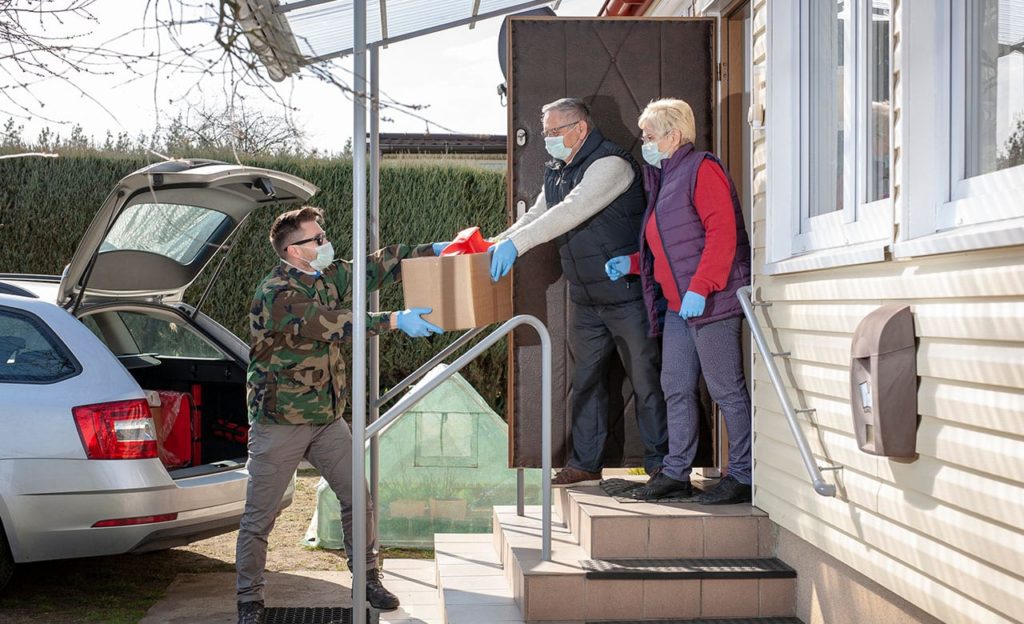Being of service is arguably one of the best ways to improve your mental health, especially if you’re an addict or alcoholic.
And no, that’s not just our opinion. There is actually extensive research on the way that volunteering and other means of helping others can improve someone’s state of mind.
Why? Well, being of service encourages connection. It tears down ego. It gets people out of their minds. It humbles… And it always leaves you inexplicably feeling as though you’ve somehow gained as much as you just gave.
Whether you’re an addict or not, if you’ve volunteered or selflessly helped someone else, you’re likely to have experienced these perks. But what can people in recovery from drug and alcohol abuse do now, while they’re stuck at home by self-quarantines and shelter-in-places?
Unfortunately, COVID-19 has put a dent in many peoples’ ability to volunteer and be of service to others. Not-so-coincidentally, people are also experiencing worsening mental health issues. In fact, right now, over one-third of people surveyed by the American Psychiatric Association report that COVID-19 is negatively affecting their mental health.
For addicts, alcoholics, and those in recovery from other mental health conditions, service is essential to their well-being and maintaining their sobriety. Unfortunately, a national pandemic has thrown a wrench into a lot of regular volunteering practices.
But fear not, Hotel California prepared an ultimate guide for being of service from home. Read on to learn ways to volunteer, even if you can’t step foot outside!

1. Call Another Addict Or Alcoholic
One reason that service helps boost your mood is that it encourages the development of genuine relationships and connections. It combats feelings of loneliness and isolation. Not only this but when someone helps another person with pure intentions, they forget about their own needs and pains. It’s called a loss of “ego,” and it’s super beneficial for people with a disease like addiction.
Perhaps one of the most traditional ways to be of service while recovering from addiction is to talk to another addict or alcoholic about their current pains. In twelve-step programs, like alcoholics anonymous and other support groups, a common mantra is “we keep what we have by giving it away.”
In other words, one of the best ways that people in recovery prevent relapse by helping others stay sober, too.
Just because someone in recovery is quarantined, it doesn’t mean they can’t help other addicts and alcoholics! Although meeting in person is off-limits for many Americans, a simple phone call or skype call can suffice. If you have a peer that needs someone to talk to during self-quarantine, give them a ring. A few simple moments of connection can turn someone’s entire day around. Plus, it’ll give you a little mood boost!
2. Offer Your Skills And Talents To Others
Everyone has unique skills and talents that, if used creatively, can seriously benefit others.
Perhaps you’re a master painter who can send beautiful art to a nearby nursing home and brighten some senior citizens’ days. Or, maybe you’re extremely skilled at building websites and it just so happens that your friend’s small business desperately needs a helping hand while experiencing financial insecurity.
Maybe you’re a chef by trade who finds time to cook meals for a local homeless shelter (with a social isolation-friendly drop off option, of course.)
No matter what, there are ways to use YOUR unique talents to benefit others, it just takes a little bit of thinking outside of the box!
3. Set Up Online Support Groups Or Meetings
If you’ve got the time, you can set up an online AA meeting. For the amount of people in recovery from substance use disorders, virtual support groups are in high demand.
Simply by following certain guidelines and getting a meeting registered online, you can open up your meeting to the entirety of your community (and the world.)
4. Donate To A Rehab Program Or Sober Living Home
There are thousands of treatment facilities and substance abuse treatment programs across the country that help those in early sobriety live a drug-free life. Similarly, sober housing helps people looking for long term support stay sober.
If you’ve got extra food or clothing, donating to sober living houses and treatment centers can offer assistance to those who are trying to get (and stay) sober, as well. People in early recovery need as much support as they can get, and donations can help.
5. Donate To A Charity
If you haven’t got time to serve through actions and you have a few extra dollars, there is nothing wrong with donating to a charitable organization of your choice!
Plenty of ethical nonprofits exist that help better the world. From organizations that feed children in third world countries, to those that help people recovering from mental illnesses, a charity likely exists for the cause you’re most passionate about.

6. Write Letters To People Who Are Vulnerable
During the novel coronavirus outbreak, many people are more susceptible than others to the sickness’ worst effects. For example, the elderly and those with compromised immune systems might be struggling with a little extra fear about contracting the virus. However, you can show these people they aren’t alone by writing encouraging letters!
When someone hears words of encouragement, it helps them tread through this trying time knowing they’re not alone. And of course, you’ll be happy to provide someone with a little extra faith.
7. Say A Prayer
What better way to help others than to devote your most positive energy and wishes through prayer or meditation?
It may seem insignificant, but praying for others really does seem to make people feel better. Prayer (no matter what it is you’re praying to) helps people stay calm and full of faith, creating a trickle effect of positivity for each person you interact with. Spreading positivity might be one of the simplest, but most profound, ways to make a lasting impact on the people around us.
8. Encourage People To Seek Addiction Treatment
If you know someone is struggling with an addiction or mental health disorder while stuck at home, encouraging them to seek out support services can help them get better. Unfortunately, social isolation is a fertile breeding ground for addiction and the worsening of many mental health symptoms.
It’s okay for people to ask for help, and it’s also okay for you to encourage someone you love to get help. Seeking a treatment program for addiction, whether it’s an inpatient program,
9. Stay On The Lookout
When it comes down to it, the opportunity to help is everywhere; it’s in the small moments when no one is looking and in a kind word spoken to a friend, family member, or even stranger. You can even encourage your friends to be selfless and help others while at home, too.
Even while at home, it’s possible to find subtle ways to help brighten someone else’s day. And we promise it’ll always brighten yours, too!
No matter what, remember that you aren’t powerless, even if you’re self-quarantined. The truth is that you can be of service anywhere, even if you’re at home on your couch. Be sure to share our article if it inspired or helped you in any way, and reach out if you or a loved one is in need of addiction treatment.
